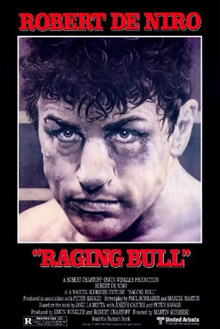
Raging Bull is a 1980 American biographical sports drama film directed by Martin Scorsese and starring Robert De Niro, Joe Pesci, Cathy Moriarty, Nicholas Colasanto, Theresa Saldana and Frank Vincent. The film is an adaptation of former middleweight boxing champion Jake LaMotta's 1970 memoir Raging Bull: My Story. It follows the career of LaMotta, played by De Niro, his rise and fall in the boxing scene, and his turbulent personal life beset by rage and jealousy.
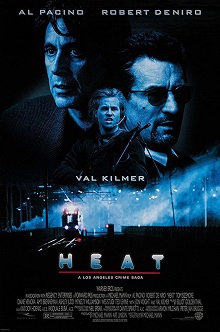
Heat is a 1995 American crime film written and directed by Michael Mann. It features an ensemble cast led by Al Pacino and Robert De Niro, with Val Kilmer, Tom Sizemore, Diane Venora, Amy Brenneman, Ashley Judd, Wes Studi, Jon Voight, Ted Levine, Dennis Haysbert, and Danny Trejo in supporting roles. The film follows the conflict between an LAPD detective and a career criminal while also depicting its effect on their professional relationships and personal lives.

Harvey Keitel is an American actor known for his portrayal of morally ambiguous and "tough guy" characters. He rose to prominence during the New Hollywood movement, earning particular acclaim from his collaborations with Martin Scorsese, having starred in six of his films: Who's That Knocking at My Door (1967), Mean Streets (1973), Alice Doesn't Live Here Anymore (1974), Taxi Driver (1976), The Last Temptation of Christ (1988), and The Irishman (2019). He has also appeared in three films directed by Wes Anderson: Moonrise Kingdom (2012), The Grand Budapest Hotel (2014), and Isle of Dogs (2018).
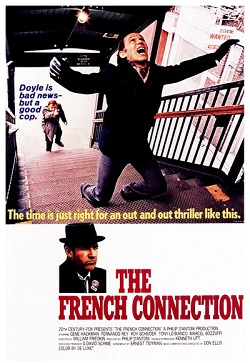
The French Connection is a 1971 American neo-noir action thriller film directed by William Friedkin and starring Gene Hackman, Roy Scheider and Fernando Rey. The screenplay, written by Ernest Tidyman, is based on Robin Moore's 1969 non-fiction book of the same name. It tells the story of fictional NYPD detectives Jimmy "Popeye" Doyle and Buddy "Cloudy" Russo, whose real-life counterparts were narcotics detectives Eddie Egan and Sonny Grosso, in pursuit of wealthy French heroin smuggler Alain Charnier.

Daniel Louis Aiello Jr. was an American actor. He appeared in numerous motion pictures, including The Godfather Part II (1974), The Front (1976), Once Upon a Time in America (1984), Hide in Plain Sight (1984), The Purple Rose of Cairo (1985), Moonstruck (1987), Harlem Nights (1989), Do the Right Thing (1989), Jacob's Ladder (1990), Hudson Hawk (1991), Ruby (1992), Léon: The Professional (1994), 2 Days in the Valley (1996), Dinner Rush (2000), and Lucky Number Slevin (2006). He played Don Domenico Clericuzio in the miniseries The Last Don (1997).

The King of Comedy is a 1982 American satirical black comedy film directed by Martin Scorsese and starring Robert De Niro, Jerry Lewis and Sandra Bernhard. Written by Paul D. Zimmerman, the film focuses on themes such as celebrity worship and American media culture. 20th Century Fox released the film on February 18, 1983, in the United States, though the film was released two months earlier in Iceland.

National Treasure is a 2004 American action-adventure heist film released by Walt Disney Pictures. It was written by Jim Kouf and the Wibberleys, produced by Jerry Bruckheimer, and directed by Jon Turteltaub. It is the first film in the National Treasure franchise and stars Nicolas Cage in the lead role, Harvey Keitel, Jon Voight, Diane Kruger, Sean Bean, Justin Bartha and Christopher Plummer. In the film, Benjamin Franklin Gates, a historian, along with computer expert Riley Poole and archivist Abigail Chase, search for a massive lost Freemason treasure, to which a map is hidden on the back of the United States Declaration of Independence.

James Burke, also known as "Jimmy the Gent", was an American gangster and Lucchese crime family associate who is believed to have organized the 1978 Lufthansa heist, the largest cash robbery in American history at the time. He was believed to be responsible for the deaths of those involved in the months after the robbery.
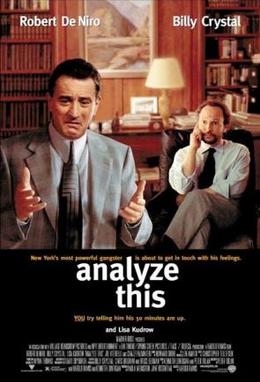
Analyze This is a 1999 American mafia comedy film directed by Harold Ramis, who co-wrote the screenplay with playwright Kenneth Lonergan and Peter Tolan. The plot follows a crisis-stricken mafioso who solicits the assistance of a reluctant psychiatrist.

Midnight Run is a 1988 American action comedy film directed by Martin Brest and starring Robert De Niro and Charles Grodin. Yaphet Kotto, John Ashton, Dennis Farina, Joe Pantoliano, and Philip Baker Hall play supporting roles.

Henry Hill Jr. was an American mobster who was associated with the Lucchese crime family of New York City from 1955 until 1980, when he was arrested on narcotics charges and became an FBI informant. Hill testified against his former Mafia associates, resulting in 50 convictions, including those of caporegime (captain) Paul Vario and fellow associate James Burke on multiple charges. He subsequently entered the Witness Protection Program, but was removed from the program in 1987.

Jane Rosenthal is an American film producer. She is co-founder, CEO, and executive chair of Tribeca Enterprises, a media company that encompasses Tribeca Productions, the Tribeca Film Festival, Tribeca Studios, and non-profit offshoot the Tribeca Film Institute. She and Robert De Niro founded the Tribeca Film Festival in the aftermath of the September 11 attacks to help revitalize downtown Manhattan.

Thomas Kapatos, nicknamed as "Tommy the Greek", was a Greek-American gangster who was associated with the Irish mob in New York City. A convicted armed robber, Kapatos was an enforcer for Hell's Kitchen crime boss Mickey Spillane during his war against Jimmy Coonan in the 1970s. He was murdered in 1977 as a result of a conflict between Spillane's gang and the Genovese crime family.

Tribeca Grill is a New American restaurant located at 375 Greenwich Street in Tribeca, Manhattan, in New York City, co-owned by Robert De Niro and Drew Nieporent. Celebrity investors include Bill Murray, Sean Penn, Christopher Walken, Ed Harris, and Lou Diamond Phillips, among others. It opened in 1990. The Executive Chef is Stephane Motir. The large mahogany bar in the center of the restaurant is from the former Maxwell's Plum restaurant.

Robert Anthony De Niro is an American actor and film producer. Known for his collaborations with Martin Scorsese, he is considered to be one of the greatest and most influential actors. De Niro is the recipient of various accolades, including two Academy Awards, a Golden Globe Award, the Cecil B. DeMille Award, and a Screen Actors Guild Life Achievement Award. In 2009, De Niro received the Kennedy Center Honors, and earned a Presidential Medal of Freedom from U.S. President Barack Obama in 2016.
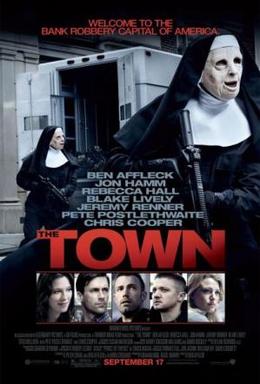
The Town is a 2010 American crime thriller film co-written, directed by, and starring Ben Affleck, adapted from Chuck Hogan's 2004 novel Prince of Thieves. It also stars Rebecca Hall, Jon Hamm, Jeremy Renner, Blake Lively, Titus Welliver, Pete Postlethwaite, Chris Cooper and Slaine, and follows a Boston bank robber who begins to develop romantic feelings for a victim of one of his previous robberies, while he and his crew set out to get one final score by robbing Fenway Park.

Tower Heist is a 2011 American heist comedy film directed by Brett Ratner, written by Ted Griffin and Jeff Nathanson, based on a story by Bill Collage, Adam Cooper and Griffin and starring Ben Stiller and Eddie Murphy with Casey Affleck, Alan Alda, Matthew Broderick, Judd Hirsch, Téa Leoni, Michael Peña, and Gabourey Sidibe in supporting roles. The plot follows employees of an exclusive apartment building who lose their pensions in the Ponzi scheme of a Wall Street businessman and enlist the aid of a criminal, a bankrupt businessman, and an immigrant maid to break into his apartment and steal back their money while avoiding the FBI agents in charge of his case.

Heist, is a 2015 American heist action thriller film directed by Scott Mann and written by Stephen Cyrus Sepher and Max Adams, based on the original story by Sepher. The film stars Robert De Niro, Jeffrey Dean Morgan, Kate Bosworth, Morris Chestnut, Dave Bautista, Sepher, and Gina Carano. The plot of the film revolves around a casino heist by an employee who needs to pay for his sick daughter's treatment.

Bitcoin Billionaires: A True Story of Genius, Betrayal, and Redemption is a 2019 book by Ben Mezrich. A sequel to The Accidental Billionaires, the book traces Cameron and Tyler Winklevoss' journey into the world of cryptocurrency, investing in bitcoin and encountering early adopters Charlie Shrem, Roger Ver, Erik Voorhees, Naval Ravikant and Dan Kaminsky, in the face of mounting scrutiny from government regulators and the financial establishment.


















